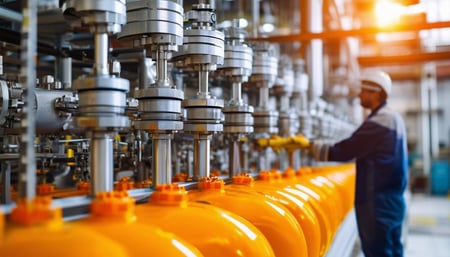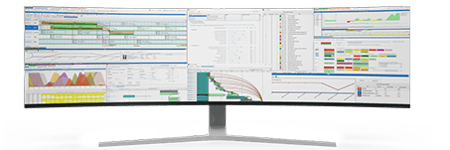AI and Predictive Analytics: Transforming Production Planning
For production planners in chemical manufacturing, the emergence of Artificial Intelligence (AI) and predictive analytics is revolutionizing how production planning, scheduling, and inventory management are conducted. The integration of powerful solutions like PlanetTogether with ERP systems such as SAP, Oracle, Microsoft Dynamics, Kinaxis, and Aveva promises to deliver the seamless flow of data necessary to unlock unprecedented operational efficiency.
This blog explores how these tools can help production planners leverage AI and predictive analytics to drive improved decision-making and overall production performance.

The Evolving Role of Production Planners in Chemical Manufacturing
Chemical manufacturing presents unique challenges. Unlike other types of manufacturing, the complexity here is defined by strict compliance standards, volatile raw materials, long lead times, and the need for stringent quality control. The production planner's role has always been at the heart of balancing supply and demand, optimizing schedules, and ensuring minimal waste. However, traditional tools and processes are often inadequate to handle the increasing complexity and speed demanded by modern operations.
This is where AI and predictive analytics come into play. The right tools, paired with well-integrated data, can provide production planners with a detailed and proactive approach to planning—enabling visibility and control that was previously unimaginable. Integration between PlanetTogether Advanced Planning and Scheduling (APS) software and ERP systems like SAP or Oracle offers chemical manufacturers a strong foundation for leveraging the power of AI to augment the decision-making process.

The Power of AI and Predictive Analytics in Production Planning
AI and predictive analytics are no longer buzzwords; they are enablers that bring real change to manufacturing processes. Here are some key benefits production planners in chemical manufacturing can achieve by incorporating AI and predictive analytics into their workflows:
Enhanced Demand Forecasting
AI-powered predictive models help production planners predict customer demand with increased accuracy. Predictive analytics takes historical sales data, market trends, and external influencing factors—like weather conditions or changes in regulations—to predict future demand. Integrating PlanetTogether with systems like SAP allows data to flow freely, ensuring that the AI models are constantly updated with the latest data.
More accurate forecasting reduces the chances of overproduction or stockouts, both of which are critical in chemical manufacturing, where raw materials and products often have shelf-life constraints.
Real-Time Production Optimization
The integration between PlanetTogether APS and an ERP system such as Microsoft Dynamics or Oracle provides a seamless connection between production data and scheduling systems. AI can evaluate production schedules in real time and recommend adjustments to minimize disruptions—whether due to machine downtime, raw material delays, or labor shortages.
Predictive analytics helps planners understand potential bottlenecks and constraints before they become problems. With a more proactive approach, planners can adapt and create alternative schedules, avoiding delays and maintaining an optimized production line.
Inventory Management and Waste Reduction
Inventory management is a crucial area in chemical manufacturing. Excess inventory leads to increased holding costs, while understocking could mean production delays. AI algorithms use predictive analytics to determine the optimal levels of inventory needed at each point in time.
When PlanetTogether is integrated with ERP systems like Kinaxis, the combined solution offers a powerful predictive inventory management capability. It leverages real-time data to ensure that the supply chain is running smoothly, with the correct quantities of raw materials and finished products available as needed. This level of precision minimizes waste—an important factor in chemical production—contributing to both cost savings and sustainability.
Scenario Planning and What-If Analysis
AI, combined with a powerful APS tool like PlanetTogether, allows production planners to create various production scenarios. What-if analyses help planners understand the impact of different events—such as unexpected changes in demand, machine breakdowns, or raw material shortages—before they happen.
Integration with tools like Aveva’s manufacturing execution system (MES) ensures that planners are using the latest information from the shop floor when running scenario analyses. AI models can quickly evaluate multiple scenarios and present the optimal plan, saving time and reducing the uncertainty that often accompanies complex production planning decisions.


Integrating PlanetTogether APS with Leading ERP Systems: A Seamless Experience
Integration is a key aspect of realizing the benefits of AI and predictive analytics in production planning. Without proper integration, even the most sophisticated AI tools are limited in their effectiveness. Let’s examine how integrating PlanetTogether with ERP systems such as SAP, Oracle, Microsoft Dynamics, Kinaxis, or Aveva adds value to chemical manufacturers.
Integration with SAP
SAP is one of the most widely used ERP systems in the chemical industry. When PlanetTogether APS is integrated with SAP, production planners have access to real-time data that feeds AI algorithms, driving dynamic and accurate scheduling decisions. The integration ensures that data related to sales, inventory, production orders, and procurement flows seamlessly, enabling holistic planning and proactive decision-making.
For example, AI-based demand forecasting from SAP can directly impact production schedules in PlanetTogether, which can then be adjusted in real time to account for changes in raw material availability or production line capacity.
Integration with Oracle
Oracle ERP and PlanetTogether form a powerful combination for chemical manufacturers looking to streamline their operations. AI-driven predictive maintenance capabilities can help production planners avoid costly downtime by predicting equipment failures before they occur. Data from Oracle’s asset management module can be used to trigger maintenance schedules in PlanetTogether, reducing unexpected production halts and maintaining high operational efficiency.
Integration with Microsoft Dynamics
Microsoft Dynamics, with its robust data management capabilities, integrates well with PlanetTogether to provide a unified view of production planning. AI and predictive analytics thrive on high-quality data, and the integration ensures that production planners are using accurate, up-to-date information when making decisions.
Predictive models can recommend when to initiate production runs, reorder raw materials, or adjust schedules based on changing demand forecasts, which are continuously updated through Dynamics’ integrated data streams.
Integration with Kinaxis
Kinaxis’ RapidResponse platform is well known for its strong supply chain capabilities, and integrating it with PlanetTogether allows production planners to benefit from end-to-end visibility. AI and predictive analytics tools can identify supply chain risks before they impact production, allowing planners to take proactive measures.
This level of integration means that production schedules in PlanetTogether are always aligned with the latest supply chain developments, whether it’s delays from suppliers or sudden changes in customer orders. By synchronizing data across the entire supply chain, AI can make more informed predictions, ultimately leading to improved on-time delivery and customer satisfaction.
Integration with Aveva
Aveva’s MES provides visibility into shop floor activities, and integrating it with PlanetTogether ensures that production schedules are realistic and achievable. AI can predict potential disruptions based on data collected from the shop floor—such as machine performance or workforce availability—and suggest changes to the production schedule in PlanetTogether accordingly.
With predictive analytics, production planners can use Aveva data to identify patterns that could impact production, such as recurring quality issues or consistent delays in a particular production phase. This allows for a more nuanced and proactive approach to production planning.
Overcoming Challenges in Implementing AI and Predictive Analytics
Despite the immense potential of AI and predictive analytics, implementing these technologies in a chemical manufacturing setting comes with challenges. Data quality, change management, and integration complexities are often cited as barriers. However, these challenges are not insurmountable.
Data Quality: AI models are only as good as the data they are fed. Ensuring data accuracy and completeness is crucial to successful implementation. Integrating PlanetTogether with ERP systems like SAP or Oracle helps overcome this challenge by ensuring consistent data flows.
Change Management: Introducing AI and predictive analytics into production planning requires a shift in mindset for many planners. It is important to communicate the benefits of these technologies clearly and provide adequate training to production teams.
Integration Complexities: Integration between different systems can be complex, particularly when dealing with legacy systems. However, modern integration platforms and APIs make it easier than ever to connect PlanetTogether with leading ERP solutions.
The Future of Production Planning in Chemical Manufacturing
The adoption of AI and predictive analytics in production planning is only expected to grow. As these technologies become more sophisticated, production planners will be able to make even more informed decisions, reduce waste, and respond to changes with greater agility.
For production planners in chemical manufacturing, integrating AI tools like PlanetTogether with ERP systems is not just about staying competitive—it’s about transforming the way planning is done. It’s about being able to see into the future, predict potential disruptions, and take proactive steps to avoid them. It’s about creating a more resilient, efficient, and sustainable production process.
If you are a production planner in the chemical manufacturing industry, now is the time to explore how AI and predictive analytics can transform your operations. Start by evaluating your current systems—are they integrated effectively? Are you leveraging all the data at your disposal to make informed planning decisions?
Consider integrating PlanetTogether with your existing ERP system, whether it’s SAP, Oracle, Microsoft Dynamics, Kinaxis, or Aveva, to unlock the full potential of AI in your production planning processes. The future of manufacturing is predictive, proactive, and data-driven—and the tools to make that future a reality are already here.
Are you ready to take your manufacturing operations to the next level? Contact us today to learn more about how PlanetTogether can help you achieve your goals and drive success in your industry.